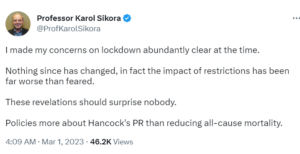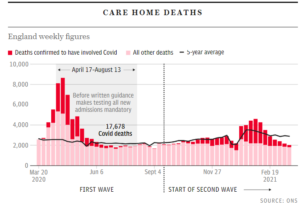In yesterday’s HOTLINE, we highlighted how Dr. Marty Makary, the Johns Hopkins professor who heads Gov. Glenn Youngkin’s medical advisory board, told a House committee that the U.S. government was the “greatest perpetrator of misinformation” during COVID.
Sadly, this was a global government cover-up of the truth.
Take Britain. The Daily Telegraph has leaked 100,000 WhatsApp messages from former Health Minister Matt Hancock’s mobile phone during the pandemic. They reveal that Sir Chris Whitty, Britain’s top science advisor, had recommended COVID testing for anyone going into nursing homes.
But Hancock didn’t follow the guidance, claiming that it ‘muddies the waters’ and didn’t “add anything” to existing rules only testing patients entering homes from hospitals. His decision to allow hospital patients to be discharged at all into nursing homes became what the Telegraph called “the defining factor behind the huge death toll in the sector.” A court ruled last year that Hancock’s actions had been unlawful.
Professor Karol Sikora, an oncologist who opposed the British government’s lockdown policies, tweeted:
Hancock was forced to resign his position as Health Minister midway through the pandemic after he hypocritically breached lockdown distancing rules by having an affair with his married top aide. He has since written a lucrative memoir defending his actions during COVID.
But in reality, Hancock acted a lot like disgraced New York Governor Andrew Cuomo, who wrote a book portraying himself as a COVID hero and selectively quoting government records that cast him in a good light.
New Prime Minister Rishi Sunak has spent $110 million so far on a COVID inquiry into what went wrong, but it hasn’t heard yet from a single government minister. There are fears that its final report may take years to see the light of day – when everyone involved is safely out of office.
This chart shows Hancock’s policies appeared to drive not only high COVID deaths in nursing homes but also high non-COVID deaths in nursing homes – perhaps because the lockdown limited beneficial social contact from families and friends. As an alternative to lockdown, the recommended testing Hancock rejected could have reduced both.


